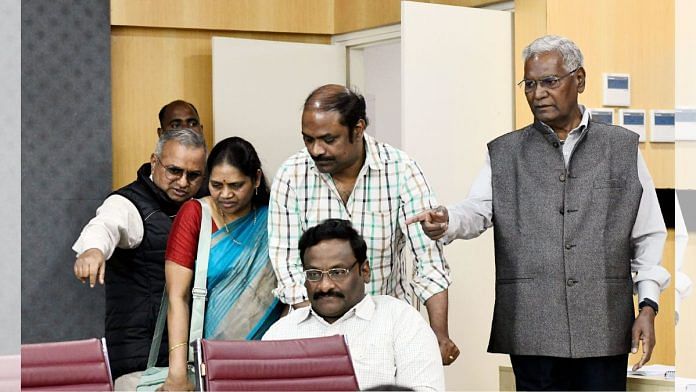New Delhi: The Supreme Court Monday described the Bombay High Court judgment acquitting former Delhi University professor G.N. Saibaba under the anti-terror law as “well-reasoned”.
Yet it agreed to grant permission to the Maharashtra government’s appeal against the acquittal because of an earlier Supreme Court judgment that had reversed the first Bombay HC order setting Saibaba free.
“We are honouring the earlier order. It is a hard-earned acquittal. How many years he suffered! (In the) Ordinary course we would not have heard it, but (are) doing so since on an earlier occasion this court has interfered,” said a bench led by Justice B.R. Gavai.
“Prima facie, it’s very well-reasoned judgment, but since there was a reversal earlier, we are admitting it and issuing notice,” the bench added, clarifying that the matter would be heard in due course and not given priority until a formal application was moved for early hearing.
The top court, however, dismissed an application by Maharashtra to stay the high court acquittal order. “Application of stay is rejected. It is unheard of for an acquittal to be stayed. The law has a presumption of innocence. It gets fortified when there is an order of acquittal,” the bench further observed.
On 5 March, the Nagpur bench of the Bombay High Court acquitted former professor G.N. Saibaba in a case of alleged Maoist links, noting the prosecution had failed to prove the case against him.
The court also set aside the life sentence imposed on 54-year-old Saibaba, acquitting five others charged along with the him.
It held as “null and void” the sanction procured by the prosecution to charge the accused under provisions of the stringent Unlawful Activities (Prevention) Act (UAPA).
“The prosecution has failed to establish any legal seizure or any incriminating material against the accused,” the high court said last Tuesday, overturning a trial court order of life imprisonment for Saibaba.
Saibaba, who is wheelchair-bound due to physical disability, has been lodged in the Nagpur Central Jail since his arrest in 2014.
In March 2017, a sessions court in Maharashtra’s Gadchiroli district convicted Saibaba and five others, including journalist Prashant Rahi and Jawaharlal Nehru University (JNU) student Hem Mishra, for alleged Maoist links and for activities amounting to waging war against the country.
The Supreme Court Monday described the Bombay High Court judgment acquitting former Delhi University professor G.N. Saibaba under the anti-terror law as “well-reasoned”.
Yet it agreed to grant permission to the Maharashtra government’s appeal against the acquittal because of an earlier Supreme Court judgment that had reversed the first Bombay HC order setting Saibaba free.
“We are honouring the earlier order. It is a hard-earned acquittal. How many years he suffered! (In the) Ordinary course we would not have heard it, but (are) doing so since on an earlier occasion this court has interfered,” said a bench led by Justice B.R. Gavai.
“Prima facie, it’s very well-reasoned judgment, but since there was a reversal earlier, we are admitting it and issuing notice,” the bench added, clarifying that the matter would be heard in due course and not given priority until a formal application was moved for early hearing.
The top court, however, dismissed an application by Maharashtra to stay the high court acquittal order. “Application of stay is rejected. It is unheard of for an acquittal to be stayed. The law has a presumption of innocence. It gets fortified when there is an order of acquittal,” the bench further observed.
On 5 March, the Nagpur bench of the Bombay High Court acquitted former professor G.N. Saibaba in a case of alleged Maoist links, noting the prosecution had failed to prove the case against him.
The court also set aside the life sentence imposed on 54-year-old Saibaba, acquitting five others charged along with the him.
It held as “null and void” the sanction procured by the prosecution to charge the accused under provisions of the stringent Unlawful Activities (Prevention) Act (UAPA).
“The prosecution has failed to establish any legal seizure or any incriminating material against the accused,” the high court said last Tuesday, overturning a trial court order of life imprisonment for Saibaba.
Saibaba, who is wheelchair-bound due to physical disability, has been lodged in the Nagpur Central Jail since his arrest in 2014.
In March 2017, a sessions court in Maharashtra’s Gadchiroli district convicted Saibaba and five others, including journalist Prashant Rahi and Jawaharlal Nehru University (JNU) student Hem Mishra, for alleged Maoist links and for activities amounting to waging war against the country.
The trial court held them guilty under various provisions of the UAPA and the Indian Penal Code.
On October 14, 2022, another bench of the HC acquitted Saibaba, noting the trial proceedings were “null and void” in the absence of a valid sanction under the UAPA.
The Maharashtra government on the same day approached the Supreme Court challenging the decision.
The apex court initially stayed the order and later in April 2023, set aside the HC order and directed it to hear the appeal filed by Saibaba afresh.
(Edited by Tikli Basu)
Also read: ‘Brazenly aided illegalities’ — how SC panel indicted ex-Uttarakhand minister in Corbett safari case



